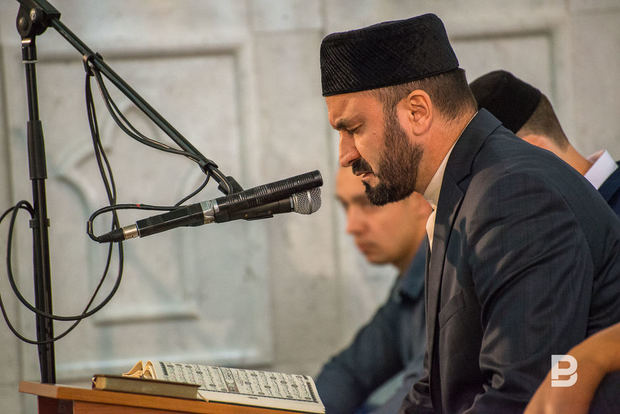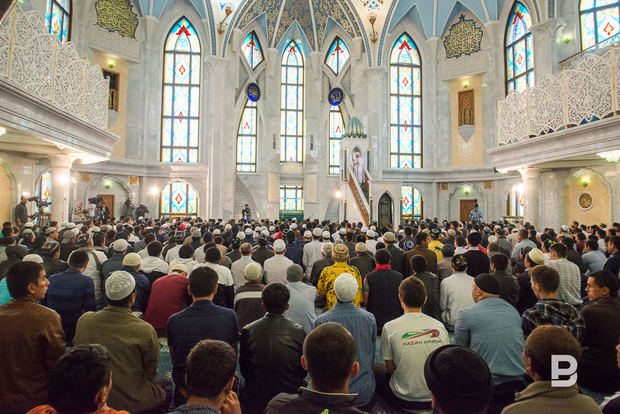‘Under communism the Tatar language was preserved due to the mosques, states secular intelligentsia’
The blogger shares his observations about how the Tatar language lives in the mosques outside Tatarstan
The debates about the Friday sermons (vagaz) in the Tatar language, started by the muftis of Moscow and Tatarstan — Ildar Alyautdinov and Kamil Samigullin, are continuing. Even a representative of the Russian Orthodox Church Vsevolod Chaplin joined the discussion. A famous Muslim blogger Rasul Tavdiryakov also couldn't stay aside from the discussion. In a newspaper column written specially for Realnoe Vremya, the columnist attempted to reconcile the two sides, proposing his decision.
A tactical decision?
I find it difficult to understand what actually has provoked the muftiat to such controversial decision. I heard several versions, which one of them is reliable only Allah knows and the leadership of MSB. Let's try to figure out.
Let's start with the fact that canonical khutba is read in Arabic, i.e. khutbah is a condition, the required part of the Friday prayers. The obligation of the khutbah in Arabic was introduced by our prophet, peace be upon him, in order to unify the Friday prayer. In other words, the prophet foresaw that Islam would soon spread to the peoples who do not speak Arabic, and then the question would arise: 'What language to use for sermons?' In order to resolve this, exactly for this purpose it was introduced the sermons in Arabic. The current debate about the Tatar language just confirms this statement. On the other hand, the prophet in all ways tried to promote the language of Quran that is why it is preferable to appeal to Allah in the Arabic language, and to read salah is allowed only in Arabic.
On the one hand, the borrowing of the prophetic method in the preservation of language and the use of the Friday sermon is a good 'copy-paste' in the context of the struggle for the survival of the nation. Even the secular intelligentsia states that under communism the Tatar literary language was preserved largely due to the mosques — the only place where it was allowed to speak publicly in this language. In other places, it was considered a sedition. A lot of water has flowed since then — the Soviet Union ended its existence, and the national republics on the advice of the head of state Boris Yeltsin: 'Take as much sovereignty as you can swallow' — they began to carry out this task. However, few of them heard what Yeltsin said then: 'But you are in the heart of Russia — and we should think about this.' Therefore, the struggle of the centre and the republics is continued, albeit transformed its forms. The conclusion: in the Republic 'at the top' they once again have decided to give the mosque the role of the saviour of the native language.

The only thing I don't understand is the transition of all the mosques of Kazan in the Tatar language. After all, it would be possible to leave at least a couple of mosques for the guests of the Republic, which is a considerable amount. The Arab students alone are about 1,000 people
Tactically it may seem not a quite right decision, but strategically, I hope it can be correct and wise. At least, the leadership of Tatarstan seems to be the patriots of the Republic and the nation, and they consistently solve facing them problems and tasks.
The only thing I don't understand is the transition of all the mosques of Kazan in the Tatar language. After all, it would be possible to leave at least a couple of mosques for the guests of the Republic, which is a considerable amount. The Arab students alone are about 1,000 people. When they come to Tatarstan they need to learn the Russian language in a year in order to study at university, and they physically will not learn a second language to understand what is said at Friday sermons.
Arabic, Tatar and Russian
Let me tell you some episodes from my life that demonstrate the urgency of the problem of misunderstanding of the sermons in the mosques.
When I was studying in Egypt, in a region where there were a lot of foreign students including me, there was a local mosque, where two imams worked, alternately serviced the Friday sermons. One of them, given the large presence of foreign students, spoke in plain accessible language, the other, on the contrary, spoke very difficult, complicated, intertwined literary language with the local dialect and raised in his speeches not very clear for foreigners political and social issues. Students have complained to the ministry of waqfs, and the hapless imam was transferred to preach in another mosque.
The following story happened in a Tatar village in Orenburg Oblast. In this village there was a madrasa, where the shakirds were studying who came there from different regions. In the mosque there also were two imams, the younger and the older. The young imam was educated, he told about Islam very well and interestingly in the sermons in Tatar. The elderly imam, following the traditions of their ancestors, opened very old book and read Arabic khutba. One day, between the Tatar- and Russian-speaking students there sparked a debate about what imam is better. The students who spoke Tatar language were indignant why the young imam did not preach every Friday because his preaching was listened to with great pleasure. Russian students, on the contrary, were glad of an elderly imam, explaining their joy that they just did not understand the sermon in Tatar, then what is the point to sit 40 minutes if they didn't understand anything except that be happy for their co-religionists, who with their mouths open were listening to the young khazrat.
It is also known that in Europe and the United States the Muslims gather on a national basis, and there are the ethnic mosques. Thus, the migrants have an opportunity to listen to a sermon not only in the official language of the recipient country but also in their own one.

The older generation and many non-practicing Tatars perceive the Tatar language as a part of religion, if not the central part
The older generation and many non-practicing Tatars perceive the Tatar language as a part of religion, if not the central part. And when they see a believing Muslim speaking the Russian language and not speaking Tatar, they have a dissonance. 'What about a mullah, who doesn't speak the Muslim language?' the unresolvable question arises.
I read that once a person from some village decided to accept Islam. For this purpose he went to an elderly villager-Tatar man and asked what he was to do to take the Muslim religion. The old man advised him to learn Tatar. Thank Allah, the guy was persistent, followed the advice of the elder and after some time he mastered the language, and then began to study Islam through Tatar books, not knowing what in Russian they are also available.
Once time I witnessed an interesting scene. An Arab entered a mosque, who had recently arrived in Russia to visit his relatives. An old man came to him and asked something, on what the Arab shook his head, showing his confusion. Then the old man angrily turned to his frustrated companion and asked in Tatar: 'Aren't you a Tatar?' And continued in Russian: 'If you do not speak the Muslim language, what good is to go to a mosque.' I had to chime in and explain the Tatar aqsaqal that this man came from the homeland of our prophet, peace be upon him, and speaks even more Muslim language.
Sheikhs but not scientists
As for the 'conflict' between the muftis of Tatarstan and Moscow. I think that Kamil khazrat Samigullin and Ildar khazrat Alyautdinov are big Islamic sheikhs. I do not call them scientists because they do not consider themselves to be scientists and ask do the same the others (and it is also one of the noble qualities of the scholars). Between people of this such of knowledge, a priori, there can be no conflict. It is an expression of their positions, based on knowledge of the situation and the realities of their surroundings, their parish and other related overt and covert factors.
As for the way out of the situation, I see the following: to allow several mosques in different districts of Kazan to hold sermons in Russian. Or, at least, to call the imams not to lengthen the khutbah and before the main sermon to read the Russian translation.